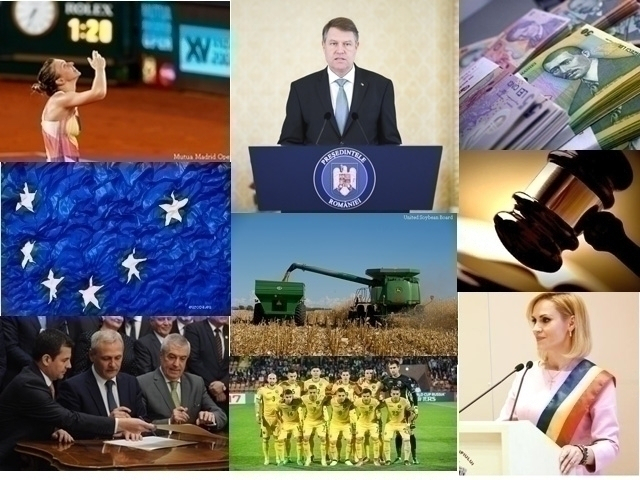March 11-16
A look at the headline-grabbing events this past week
Warning: Trying to access array offset on null in /home/web/rri.ro/public/wp-content/themes/rri/template-parts/content.php on line 53

Warning: Trying to access array offset on null in /home/web/rri.ro/public/wp-content/themes/rri/template-parts/content.php on line 98
România Internațional,
17.03.2018, 12:24
IMF
recommendations for Romania
The International Monetary Fund recommends a
balanced mix of monetary and fiscal policies and support for investment, so
that Romania may be able to uphold the growth pace reported last year. An IMF
mission visited Bucharest this week. Fund officials met with Prime Minister
Viorica Dancila, highlighting the need to step up tax collection and maintain
public spending within sustainable limits. The Prime Minister said the economic
and fiscal measures adopted by the Government are viable, estimating an
economic growth of 6.1%, mostly based on investments made with EU funds. For
nearly two weeks the IMF made a comprehensive analysis of Romania’s economy, a
process that must be seen through every year in every EU Member State that has
no ongoing agreement with the IMF. Fund officials met with authorities,
representatives of political parties, trade unions, business associations,
academia and banks.
Fickle
weather across the country
The heavy rainfall and the massive snow
meltdown triggered by the unexpectedly soaring temperatures across the country
have caused a rise in the flow of several rivers in Romania. According to the
Interior Ministry, floods affected dozens of villages in various areas, the
most serious of which were reported in central Romania. Line Minister Carmen
Dan went to personally ascertain the damages, trying to convince the locals to
leave their homes until the danger has passed.
Regional
meetings in Bucharest
Romania’s Foreign Minister Teodor Melescanu
received his Bulgarian and Greek counterparts in Bucharest, Ekaterina Zaharieva
and Nikos Kotzias, respectively. The three held talks during the
Romania-Bulgaria-Greece trilateral meeting and discussed issues of strategic
regional relevance, such as the developments in the Western Balkans, the
eastern neighbourhood, the Black Sea area, the Danube Strategy and the
prospects of the Middle East peace process . The three ministers agreed that
community funds are grounded on the principle of European solidarity, and that
the future EU budget should be balanced and not sacrifice subsidies to
agriculture and cohesion. Also this week Bucharest hosted a meeting of NATO
Defense Ministers from nine former communist states. The Ministers agreed that
NATO’s eastern flank must be consolidated. Romania’s Defense Minister Mihai
Fifor said allied presence is robust alongside NATO’s entire eastern flank,
both in the northeast, in the Baltic States, as well as in the southeast, in
Romania and the Black Sea region. Bucharest and Warsaw are the engine of the
so-called B9 Initiative, which also comprises Bulgaria, the Czech Republic,
Estonia, Latvia, Lithuania, Slovakia and Hungary. The Foreign Ministers of the
nine countries wanted to reach a common approach ahead of the NATO Summit
scheduled to take place in Brussels in July.
Solidarity with the United Kingdom
In a message launched on Wednesday, the Romanian Foreign
Ministry has expressed solidarity with the United Kingdom and firmly condemns
the use of a military-grade nerve agent on the territory of an Allied state.
The reaction comes after British Prime Minister Theresa May has said Moscow was
guilty of the poisoning, in south-western Great Britain, of the former Russian
double agent Serghei Skripal, of his daughter and of a British police officer.
Many voices of the international community have deemed Skripal’s poisoning as a
severe breach of international norms and agreements on chemical weapons.
A unionist wave is sweeping the Republic of Moldova
The number of communes and towns in the
Republic of Moldova (a former Soviet state with a predominantly Romanian
speaking population) where mayors and local councils have adopted symbolical
declarations stating their wish to reunite with Romania has reached 120. These
local leaders as well as all those supporting the reunification idea are
expected in Chishinau this month, to attend a big people’s assembly to mark 100
years since Bessarabia united with Romania.
Initiated by the Alliance for the Centennial Anniversary, made up of
civic organisations from the Republic of Moldova, Romania and the diaspora, the
meeting is meant to reiterate their confidence that the Union is the only solution
to restoring historical truth, joining the EU and NATO, to ensuring welfare and
freedom. A province with a majority Romanian-speaking population and part of
the Tsarist Empire, Bessarabia united with Romania in the wake of WW I, on
March 27, 1918. The Soviet Union re-annexed it, in 1940, following an
ultimatum, and on part of its territory, the current Republic of Moldova was
set up.
Romanian
books in Germany
20 years on, since it was honorary guest
of the International Book Fair in Leipzig, in eastern Germany, Romania has
again enjoyed this status, this week. One of the oldest events of its kind in
the world, which promotes reading, has brought together over 2,500 exhibitors
from 48 countries. Visitors had the chance to meet Romanian writers who are
already well known in the German-speaking area such as Nora Iuga, Mircea
Cărtărescu, Norman Manea and Filip Florian, as well as budding writers like
Lavinia Branişte and Bogdan-Alexandru Stănescu.Over 40
translations from Romanian literature, most of them supported by the National
Book Centre with the Romanian Cultural Institute have been promoted.




























